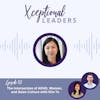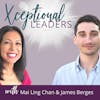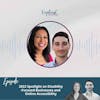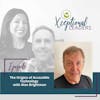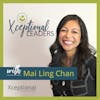Valuable Resources for Disability Entrepreneurs with Nikki Powis

Mai Ling chats with Nikki Powis about some fantastic resources for disability entrepreneurs in today’s episode. Nikki is the Director of the National Disability Institute and she shares how she started at NDI and some of the top challenges for...
Mai Ling chats with Nikki Powis about some fantastic resources for disability entrepreneurs in today’s episode. Nikki is the Director of the National Disability Institute and she shares how she started at NDI and some of the top challenges for entrepreneurs based on her over three decades of experience in this space. She also gives some tips for investor pitches and speaks about how the social impact of business ventures is an integral element of successful businesses.
Additional Resources
Exceptional Alliances Epic Accessibility EVENT
Disability Owned - Streaming television channel for entrepreneurs with disabilities.
Contact Mai Ling: MLC at mailingchan.com
Contact James: James at slptransitions.com
Nikki Powis 0:00
One of the things we focus on a lot is preparing that pitch, being able to really tell your story in a succinct way that makes sense to it may make sense to you and it may sound wonderful, but it's got to be, you know, on point to those that are looking to actually invest.
Mai Ling 0:24
You're listening to the Exceptional Leaders podcast. Each week, we give you a front row seat to our conversations with new and successful exceptional entrepreneurs and thought leaders making an impact. They share their intimate experiences so you can start grow and expand your impact. I'm Mai Ling and you can find me at Mai Ling Chan dot com.
James Berges 00:42
I'm James Berges of SLP transitions dot com. And today we are going to be chatting about Nikki Powis and the fantastic resources and support available through the National Disability Institute's small business hub. And this is relevant because October is National Disability Employment Awareness Month.
Mai Ling 0:59
Yes. And you'll hear people saying NDM. And I was like, what is that?
James Berges 1:03
We need more acronyms, don't we?
Mai Ling 1:06
Yes, or maybe it's NDEAM I think I say NDEAM. Yes more acronyms, yay.
James Berges 01:11
But this is, this is perfect episode for this month because Nikki is doing amazing things with bridging the gap for entrepreneurial people with disabilities. And fun fact, Mai Ling people with disabilities tend to start more businesses than those without disabilities. And you know, that's a whole another discussion of why, either by necessity because they can't fully access the workforce and or by passion because they have this mission inside of them and they want to make an impact or just have more flexibility in their lives. So Nikki goes into the challenges of entrepreneurship and what her organization does, including how to access capital A K A investment, you know, to start these small businesses and a lot of people with disabilities have that challenge because they have medical costs or their credits affected by medical bills. And so how can entrepreneurial people with disabilities access funding in new and creative ways? And part of that, Mai Ling, is the pitching? So what do I mean by pitching? Well, you have to go in front of a crowd of investors and make the case of why they should give you money. And that's maybe one advantage for people with disabilities because they tend to have a personal story. Like I think of Shark Tank when they're saying, you know, this is why I started this business. And sometimes it's just like, ok, you're really reaching for this impact. You're trying to make it sound really heartwarming and moving. But for many people with disabilities, it truly is something near and dear to their heart and really filling the gap where they couldn't find it themselves.
Mai Ling 2:44
So many good things in there. Yes, and I, I am thinking back to this interview, it took like a maybe six months to plan this because I had started, I found National Disability Institute for my own resources. They have so many great events and conferences and free. It's all free information tools and this is all for the small business section, so I highly recommend that you go to National Disability Institute dot org and something that actually I forgot to tell you, James, is I'm going to be the keynote speaker for their upcoming event as we're talking about it, like, oh, wait, I got to share this. It's called a Convening event and it is November 2nd from 4 p.m. to 4 50. No, that's actually the opening, but it's called lessons learned insights into starting and growing a small business. And I get to talk about in spotlight amazing disability entrepreneurs that I've interviewed and had in my books and I'm really, really excited to be kicking off this event.
James Berges 3:46
Wow, that's super exciting. Looking forward to that. And Heather Lawver who is mentioned in this podcast, started an organization called Perfectly Pitched, Speaking of pitching and starting a small business and I believe she is joining one of your other events, Mai, you're kind of everywhere these days.
Mai Ling 4:05
I know it's funny, funny you should bring that up. So James is referring to the Exceptional Alliances Epic Accessibility Event. It's free, it's online, it is October 20th. Please register exceptional alliances dot com and jump in on any and all of the sessions they are from opening to closing everything about accessibility and the speakers are absolutely incredible. We have 50 presenters, James, and they're going to be presenting as part of round table discussions and 10 minute keynote presentation. So I like to say for those of us with a DH D and don't want to sit all day, it's just going to be very engaging and fast-paced. So, one of the the people that I want to highlight is Lydia Brown. If you're out there and you know of them, they're an amazing advocate in the disability space. That's the opening keynote speaker, Tom Foley and Nikki Powis are both going to be joining us in different round table discussions and they are representing National Disability Institute. So really excited to have them.
James Berges 5:06
Wow. Yeah, I was looking at the lineup and I registered and I'm just excited to see like you said, there are these quick presentations and it's round tables and round robins and different people coming together from different fields. So it's not like this siloed thing, which I think is sort of a problem in many of our fields. We only look at research in SLP or only look in research in ot it's like accessibility affects, you know, all of us and we need everyone to come together to talk about it at the same time. So I love that you're doing this and remind me and our listeners the date or the last date to register.
Mai Ling 5:41
Thank you. I believe it's going to be right up until we start. Honestly, it's just going to be open. So I would still register sooner so that it gets on your calendar. And, you know, you can kind of plan your day if you want to get access to the recordings that is available as a community member. It's only 19.99 and you can sign up through exceptional lab. So if you can't make it, it's there for you. And that's one of the things that Nicky and I talked about is this inter profession, you know, inter organizational networking and connecting and supporting. You know, a lot of times we get stuck in our, I call it our fish bowls. You know, like you said, James, I'm a speech therapist. I only work with speech therapists and that's great, but you're kind of relying on other speech therapists to go out and connect and bring that back home, you know. So what we're really trying to do is bring all different professions and people to the table to have these discussions and share and create. So we're hoping it's going to be a very robust chat section too. I love when they ask an open ended question. Like, so, you know, have you ever ever experienced this or how are you doing with this? And then you just blow up? Right? And I just, I love that because I feel like I'm a part of it.
James Berges 6:44
Yeah. And it kind of speaks to the community aspect of things where it's not just a virtual event where you're passively watching, you're actually getting, you know, more power from everyone who's there and more discussion spark. And speaking of that, you know, that's part of why we do this podcast is we don't want to only just talk into a microphone. We love it. We love sharing these stories. We would love for you to join the conversation and also go on your favorite podcast player, wherever you're hearing this right now. I'm curious, are you on Spotify? Are you on Apple podcast? Where are you go ahead and, you know, leave a review or email us or, you know, message us on Instagram on exceptional leaders and let us know, you know, let us know what you're thinking, what's on your mind. What topic should we be covering? We'd love to make this a two way conversation. So yeah, if there's nothing else, I'd say, let's hear from Nikki Powis about National Disability Institute.
Mai Ling 7:39
Let's do it.
Mai Ling 7:45
All right. So I'm here today with Nikki Powis and she is the Director for Small Business Programs at the National Disability Institute. And I started following this group probably about six months ago. And I was just amazed at all of the resources and information and just everything that's coming out of there. And when I started to ask around, I was finding that not a lot of people knew about this program, I reached out and the team there was fantastic. And I said we have to get Nikki on the show. So welcome Nikki.
Nikki Powis 8:13
Thanks so much, Mai. Really appreciate it.
Mai Ling 8:16
Yes, I'm so excited. There's a lot to unpack here. And so for our listener, the first thing I want to do is tell you, you need to write down National Disability Institute. We will definitely give you the contact information at the end and in the show notes. But if you're listening to the show and you have an idea, then this is the, the website, the team, the support system that you need. So before we jump into everything that's available, Nikki, I always like to find out about the people behind everything. So can you share with us a little bit about your why, how did you get involved, and why do you continue to stay at the helm as the director?
Nikki Powis 8:50
Ok. Yeah, absolutely. So, I've been with National Disability Institute for about seven years and when I first came, I was actually on a different team, supporting workforce and folks with disabilities entering, you know, competitive, integrated employment and doing a lot of technical assistance around that. So not necessarily small business. And that's kind of been my sort of career journey. I worked for a state agency for 16 years, overseeing a lot of different workforce programs. And along the way, there was sort of an integration of the standard workforce system and the vocational rehabilitation system and sort of the lack of synergy that was existing at that time many years ago to really open up all all of the available resources and programs to individuals with disabilities and sort of really a recognition of the gap in that. So I started becoming an evo involved in a project that really sort of brought those two worlds together and got very excited about it. Then actually, along my life journey, I ended up with a child with a disability. And so obviously, that led me down a whole bunch of other pathways and educated me in ways that I had no idea I even needed educating, but certainly broadened my horizons. And then when I came to National Disability Institute, like I said, I was just so excited to look at all the different opportunities. And then when we had the opportunity to apply for a small business grant through the Small Business Administration, we just kind of jumped on it because recognizing that statistics tell us that there are more people in the workforce with disabilities who choose entrepreneurship and self employment than those without and, and there are, you know, there's this sort of again, ecosystem gap, those sort of bringing together of those puzzle pieces if you will to be able to really address that. So it's just something that I got really passionate about excited about. I actually have four children, one that has a significant disability, but two of my others, actually, all three of the others to be honest have been entrepreneurs. And I've seen sort of first-hand their struggles and the things that they've gone through and just, it's just been so exciting, rewarding, and I've met some just incredible founders and that. So, yeah, so I'm still here. I love it. We're trying to expand as much as we can bring in new initiatives and just continue to, to do the good work. So that's, that's me, I guess.
Mai Ling 11:42
I love it. So you personally don't have any experience as an entrepreneur. Is that correct?
Nikki Powis 11:46
I don't, I've never started, you know, I mean, when I was a young mother, I did things like tupperware sales and you know, years ago, those kinds of things. So, I mean, I suppose, you know, that sort of is, you know, in some ways you're sort of working for yourself. But no, I've never started a business from the ground up. Fortunately, my team members have, yeah. So I think collectively we have some great experience and bring it all together. One of our team members, Ruth Chavez, she is our Navigator and sort of really is sort of the front line if you will with the entrepreneurs. And she spent 10 years working for the Small Business Development Center and she is an entrepreneur herself. And then we also have Caroline Bolas who also has been in business for herself and has also worked with the Social Security Administration. So just has, you know, I think as a team, we're really well rounded. So, whereas I don't personally have that direct business experience through you know, vicariously through my children and then through the other team members. Yeah.
Mai Ling 13:00
Excellent, and that actually is a perfect example for our listeners because most of us start in areas that we are not really experienced in, but we have a great idea, we see the need and that sounds like exactly what you did. And so I would almost say that you are the entrepreneur for this specific segment for NDI would, you agree?
Nikki Powis 13:20
You know, it's funny that you catch it that way because I guess so, you know, I'm always looking at where are new opportunities, where are new ventures, where are new branches that we can grow and develop. And that is very entrepreneurial. So, yeah, I would say that's probably a true statement.
Mai Ling 13:36
Excellent. And I do, I do think that most of the people that come to entrepreneurship in general, right? They don't have that MB A background which, you know, a lot of people think, oh, if I'm going to go into business, I need to get that. It's the hard knocks school of hard knocks certificate. And if that's the case I have a PHD.
Nikki Powis 13:56
Absolutely. Absolutely. Yeah. And, you know, and I think in life in general, in any career field, whether it be, you know, paid employment or whether we're starting our own venture, it is that growing and learning as you go and just sort of like you said, the goal of hard knocks and, and recognizing all the things and, and a lot of folks that we work with, you know, they have wonderful mentors and having that mentorship. And, you know, we try as a team to be that as well coming from different experiences. And also we bring together groups of entrepreneurs so that they can kind of be peer mentors for each other. And so, yeah, I think, you know, I think all of our journeys, I mean, do we ever sort of get up in the morning when we're five and say I'm going to be this when I grow up, I want to graduate college? You know, do we say, oh, I'm gonna do this and then we look back 20 years later and say, you know, I, I never thought I would be here. I mean, my, my initial background, my degree is in performing arts. So yeah, I'm, I'm not doing performing arts at all. So and I think that's so true. So many people, you know, you start, whether you do the MBA or, or you start in a different direction, you ultimately come to what your passion is, right? What fits you, what, what your, where your journey takes you.
Mai Ling 15:20
Absolutely. Well, years ago, I don't know anybody who I went to school with, who said, you know, I'm graduating and I'm going to be an entrepreneur. But nowadays they actually, I do have, you know, seed level entrepreneurial programs for colleges. And it's incredible that these kids, you know, they go into college knowing it already. I do have a funny personal story. My son will probably kill me. But one of my sons, he was in high school and it probably early freshman something. And I said, ok, you know, we need to start thinking about college and what do you want to do? And he says I'm going to be a consultant. I know. And I was like, ok, and I realized that at that point I was consulting, my husband was consulting, their dad was consulting. And so that makes sense, right? And I said, well, you know, you really should find a profession and become, you know, an expert in that area and then you can consult. And he was like, oh.
Nikki Powis 16:12
Yeah, oh, I have to have some information, you know, that, that brings me to a good thought back in the sort of the workforce development arena. A lot of times when we were working with, you know, college to work or school to work, it was more about deselecting, exposing, you know, youth to interests and things that they enjoyed. But so many times their frame of reference was only what their family does, Right? So, and, and I think that aligns with entrepreneurship, too many of our entrepreneurs are entrepreneurs because that's what their family's done. You know, their father started a business, their grandparents are in business, you know, same as work and it's, it's sort of experiencing that and fighting not so much. Hey, that's for me, but that's not for me. That's not what I wanna do. You know, your son may have said, oh, gosh, I don't want to be a consultant. I've seen what that looks like. I wanna do something different. You know, same I think with, with small business people can say, I know it's a lot of work because my family's done it. I've been part of that. Maybe they want to, maybe they don't. But yeah, to your point with the is I think it's amazing and wonderful as well that at that young age, that sort of entrepreneurial spirit, that creativity, that initiative, that problem-solving all of the things that are those real soft skills that are needed beyond the formal education to go into business, are being nurtured and you know, and people are given that opportunity.
Mai Ling 17:46
Yeah, it's phenomenal.
Mai Ling 17:49
If you're like me, you can't get enough of books, podcasts, blogs and other ways to find out how to create grow and scale. That's why I brought together 43 disability focused leaders to give you more of what you're looking for. You will hear their stories in three best selling books which focus on general offerings, augmentative and alternative communication and Speech Language Pathology. I invite you to search for Becoming an Exceptional Leader on Amazon. So you can learn intimate start up pearls of wisdom and keep growing your brilliant idea.
India Ochs 18:22
Hello, I am India Ochs. And we are inviting you to join dynamic conversations with a community of people who are working together to make the world accessible for everyone at all times.
Mai Ling 18:35
And I'm Mai Ling Chan and we're so excited to share the Exceptional Alliance's epic accessibility event to talk about all of the ways we can optimize how the world is experienced.
India Ochs 18:44
That's right. Mai Ling, accessibility isn't just about entry and curves. It's about vocabulary policy, innovation research, how we access the world electronically and so much more, join exceptional alliances on October 20th and interact with intimate round table discussions about that and experiences.
Mai Ling 19:08
Registration is free. And it's important to remember that just by registering, you are actively supporting virtual event access, which demonstrates the value and continued interest in virtual events and supports accessibility. So grab your free spot at exceptional alliances dot com and we look forward to chatting with you during the event.
Mai Ling 19:27
Now let's get back to our amazing interview. So let me ask you what is one of the biggest challenges or the questions that you find most entrepreneurs are asking of NDI?
Nikki Powis 19:37
You know, there's kind of a few challenges that are sort of rise to the top and are key critical issues. But one that I think it doesn't matter whether you're an entrepreneur with a disability or not, obviously, the access to capital is always the huge thing and especially for individuals with disabilities, a lot of times, you know, they may be on public benefits. So their current income prior to be revenue generate rating doesn't really lend itself well for a bank to say, oh yes, you have enough income to be able to pay this loan back, sure, here's the money or perhaps there's been periods of time where they have not been in the workforce because of a medical or a disability related issue or perhaps there's, you know, credit issues because of medical costs or, you know, things like that. So I think it's harder in many ways for entrepreneurs with disabilities to really get that access. And so then sort of being able to bring to light some of the other opportunities through whether it be a CD FI a community development financial institution as opposed to this traditional bank lending. Whether it's looking at some of those grant opportunities un you know, looking at what is bootstrapping look like, you know, really sort of diving into just because you can't go and walk into a traditional major bank and get a business loan. What other options are there? How can we explore that? So, I think that's probably the biggest thing and also sort of understanding what that looks like. What do I have to bring to the table? What do I have to have, how do I have to have my ducks in a row financially to be able to really demonstrate that this is viable and that I can get that capital, whether it, you know, whether it be to a lending and institution or an investor, you know, one of the things we focus on a lot is preparing that pitch. And you know, and being able to really tell your story in a succinct way that makes sense to it may make sense to you and it may sound wonderful, but it's got to be, you know, on point to those that are looking to actually invest.
Mai Ling 21:59
Yes, and I'm going to jump in here. I am actually so honored to be working with the Arizona Commerce Association as a coach right now for a virtual accelerator program. And I've been paired with Victor Ocando Finol and he is a founder with a disability who is creating adapt the game, which is really cool. It's this app that it's allowing people to find accessible seating and also all the other information about the venue, which is just phenomenal. Right? And in this area, what I'm seeing is how to include, right, how to include the founder's connection with the disability and their passion for what, why you know the why of what they're doing. Because, you know, Nikki, you know, in the pitch, this is what is all about is as that person is listening to the pitch or scrolling through that deck, it's why should I care, right? And it's really interesting and so one of the things that I'm finding is with the disability market, I mean, we know that there is so much money that could be spent with marketing towards disability audiences and the expendable income that they have, you know, is phenomenal. So we want to be including those audiences, right? But in some instances, there isn't going to be that much of a shift in income, right? Because the product is being sold, there's only so many things that you can sell. And I think when I talk about like a sports venue, there's only so many seats. So if that concert or sports event is going to sell out, it's going to sell out, right? So now what we're doing is we're trying to say that this niche of audience is really important and we want to make sure that they have access and that they can get, you know, to their seats and they can have a an enjoyable experience all of that. But that turns into why does the company care? And so, right? And so this is very interesting to me. So how are you working with our disability entrepreneurs to help them care, and is there, you know, of course they want a effect to the bottom line, you know, because it's numbers, I mean, most times when you're pitching, I'm going to give you this amount of money and this is the amount of money I'm going to make and it's going to come back very fast. You know, it's a timing and amount issue, but this is the other like the social impact piece, which is priceless and also just kind of unquantifiable, right? So what are you seeing there?
Nikki Powis 24:23
Yeah. I, I think, you know, in general, most of the entrepreneurs that we've worked with are very cognizant of that social impact piece. And I think maybe it's because, you know, they themselves have not always experienced a sort of caring environment to their sort of conditions or barriers or challenges. And, you know, what we're also trying to do is we're trying to sort of pay it forward so that as we're working with entrepreneurs with disabilities, if we have spaces in which there's an opportunity for them to have a contract or come and teach something or provide a presentation or training to others, then, you know, we're taking advantage of that. One of the things that comes to mind is one of the entrepreneurs that recently worked and gave us some presentations in our financial health cohort. So we have a financial health for business training series that runs for six months and folks meet a couple of times a month. The first time is always sort of a content learning knowledge exchange with Q and A and stuff. And then the second session of the month is an opportunity to really dive into that topic and talk about their experiences and things like that. And it culminated in we're actually next week having a pitch competition for that cohort that is just graduating. And so Heather Lawver, who is a wonderful founder with a disability, she founded, her company is called Perfectly Pitched and she has helped numerous founders access, I, I think she's up to about something like $12 million that she's helped people get through their pitches and she, she hasn't been doing it for very long. But, you know, she talks a lot about, you know, the why the, that social capital piece and, and I think people, a lot of people with disabilities, they just get it, you know, they're just like that, that's what they're doing. They're wanting to have an impact on their community. I just spoke with a founder this morning actually where she was, she, she's in the financial health sort of industry and she sort of helping people understand how they can use money to make more investments and things like that. Even if you don't have very much to start with and she had some wonderful tips that I was even like, oh, that's a really good idea. But, you know, she said we need to look at it through the lens of retirement and generational wealth. So retirement we need to think about that's for us, right? So, we're, we're looking at how can we retire, how can we, you know, collect enough money to support ourselves? But she said beyond that, it is social impact is how are you going to leave a legacy not only maybe to your Children but to your community. What, what is your legacy? What is, you know, what, what, why are we not thinking sort of beyond, that and that, that was really meaningful for me. And I was just this morning. Her name is Ruby and she runs Financial Joy school, which I love because most of us don't think of finances as being joyful. So I love that name, you know, but, you know, that, that just really made me think of it and, and a lot of founders we're working with, they are so they have such great innovation and such great ideas. And a lot of them come from a niche of where they see a need and a gap that has a social impact that, you know, does help communities, societies, does work with that. So I, I think in many ways that's just sort of a natural, a natural thing that it is helping people to understand. How do you, how do you promote that? How do you, how do you get that emotive piece right from an investor? Because we, we all relate relationally, we all connect as human beings. And that's, I think the piece is that connection. It, it's great that yes, I'm gonna do this business and it's gonna be this and it's gonna generate that and it makes good fiscal sense for me to invest in that. But I'm gonna be more likely to if there is that human relational components that really makes me care that brings in compassion and empathy.
Mai Ling 28:52
Exactly. OK. Well, you brought up Heather and so this is a great time for us to talk about you being a part of the epic exceptional Alliances, virtual accessibility event. It is on Friday, October 20. It's all day, it's free. Nikki is going to be part of a panel presentation with us that day and let's just say the name of that session is Building an Accessible Alliance. It's just perfect for you Nikki. I'm so glad that you're able to join us on that. And then also you introduced us to Thomas Foley. He's the Executive Director of the National Disability Institute. He will be joining us earlier in the day on the panel for Accessibility, Ethics and Justice and then Heather, she is fantastic. I am so happy that you introduced us to her. She will be part of our new technology spotlight pitches because she has taken her expertise, her talents and she's put it into an app, which is incredible and I'm just, I'm loving everything about it and we are inviting her to share this as part of our new tech spotlights in the afternoon. So, very excited. Please sign up, it's free, it's exceptional alliances dot com. And again, it's Friday October 20th. And now this is a good time to Nikki for you to kind of spotlight everything that our listener can achieve and join through the National Disability Institute.
Nikki Powis 30:13
Yeah, absolutely. So, we have the National Disability Institute has its own, you know, overarching website, but we have a connected website that is just for the small business work where you can go and find out all about our upcoming events. Go to the archives of the national webinars, sign up for the newsletter. We have podcasts on there ourselves, all kinds of videos, lots of things. So the website for that is disability small business dot org. So disability, small business, all one word, dot org. And that's sort of the centralized hub, we call it our small business hub. There's a ton of resources on there. And then the other exciting thing that's connected with the program that we've got is we have a streaming television channel that is absolutely for entrepreneurs with disabilities, that has a lot of educational content. It has stories, it has motivational stuff. It's on Fire, Apple TV, Roku TV. And it also is available through the app stores or you can just get there through the website. We, I will say we're in the throes of redoing the website. So if it seems a little clunky stick with it, we're changing it. That that is disability owned dot com. So disability owned dot com for that. And then, you know, through our small business dot org website, you can sign up to connect, you know, our emails are on there. There's a form that you can just say, hey, I want to connect either as a partner or as an aspiring entrepreneur or if you're already an entrepreneur looking for growth, you know, we work with the whole spectrum of small businesses wherever you are in your business journey.
Mai Ling 32:00
All right. And now I ask the big question, how much does all this cost?
Nikki Powis 32:03
It doesn't cost anything. It is all, yes, it's all grant funded. You know, we have federal grants, we have financial institutions that we have grants through. So we have a combination of different things. And I should mention, you know, we just talked about the Exceptional Alliances event coming up. We also have a national convening where we're going to be bringing together some fantastic presenters and a lot of panelists that have disabilities that have small businesses that you can really hear from. And that also starts in October, but it's October the 31st, November 1st and November 2nd and it is 100% virtual as well. So just if you want to know about that again, just connected through the website or my email is N Powis Powis as in Sam at NDI dash inc dot org.
Mai Ling 32:57
Excellent. And I really encourage you to sign up because we have seen that a lot of these events everywhere, all different types of organizations and associations have gone back to in person. And that's really ostracizing people who can't go whether it is for health reasons. It could be that they're a primary caregiver, it could be that they're a single parent. And then of course, the big elephant in the room is finances and just the ability to travel. So having virtual and hybrid events is essential and so supporting things like what Nikki and I are doing is so important. If you can register at least, you know, we'll get those registration numbers and then being able to come in for session or two, will your sessions be recorded, Nikki?
Nikki Powis 33:38
They will, they'll be recorded and then they'll be posted on our website and also they'll go on our streaming TV channel. And if you want to check out what last year's look like, that was our inaugural one was last year. That's on the website and on the streaming TV channel as well.
Mai Ling 33:52
Perfect. Perfect. Thank you. Thank you for all that you and your amazing team are doing for us and we are so excited to have you come on to the panel in October for the Epic Exceptional Alliances event.
Nikki Powis 34:05
Thanks for having me. It was great chatting.
Mai Ling 34:08
Wonderful. Thanks. We hope you enjoyed this episode and invite you to leave us a review on Apple podcasts and Spotify and share the show with people you think will find value from it. This helps the show a lot or have a great guest referral. Reach out to us at X leaders at gmail dot com.
James Berges 34:37
And if you want exclusive tips on becoming an exceptional leader, deliver straight to your inbox, just go to xceptional leaders dot com and sign up for our mailing list. Thanks for listening.
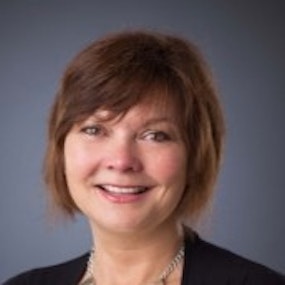
Nikki Powis
Nikki Powis brings over 30 years of experience managing programs to advance economic opportunities for underrepresented and underserved populations at the local, regional and statewide level. Nikki has worked as an educator and coordinator of Workforce Programs to include education and expansion of small business ownership and has experience developing curriculum for entrepreneurship and small business development.
New to Xceptional Leaders with Mai Ling Chan & James Berges?
Here are some great episodes to start with. Or, check out episodes by topic.






